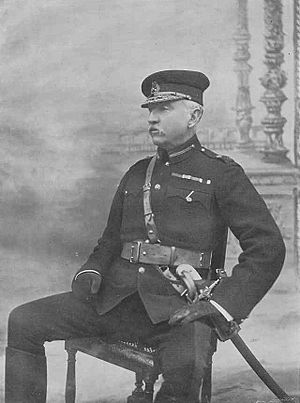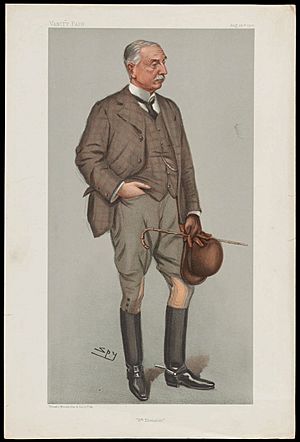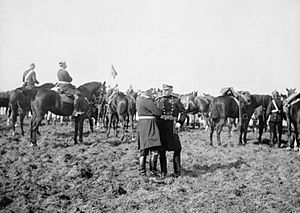Thomas Kelly-Kenny facts for kids
Quick facts for kids
Sir Thomas Kelly-Kenny
|
|
|---|---|

General Sir Thomas Kelly-Kenny
|
|
| Born | 27 February 1840 Kilrush, County Clare, Ireland |
| Died | 26 December 1914 (aged 74) Hove, Sussex, England |
| Allegiance | United Kingdom |
| Service/ |
British Army |
| Years of service | 1858–1907 |
| Rank | General |
| Unit | 2nd (The Queen's Royal) Regiment of Foot |
| Commands held | Adjutant-General to the Forces 6th Division |
| Battles/wars | Second Opium War British Expedition to Abyssinia Second Boer War |
| Awards | Knight Grand Cross of the Order of the Bath Knight Grand Cross of the Royal Victorian Order |
General Sir Thomas Kelly-Kenny (born February 27, 1840 – died December 26, 1914) was an important British Army general. He is best known for his role in the Second Boer War. He also served in other conflicts and held high positions in the army.
Contents
Life and Military Career of Sir Thomas Kelly-Kenny
Early Life and First Wars
Thomas Kelly was born on February 27, 1840, in Kilrush, County Clare, Ireland. He was the fifth son of Matthew Kelly and Mary Kenny. He studied at St. Patrick's College, Carlow. In 1874, he added "Kenny" to his name. This was because of his uncle, Dr. Mathias Kenny, who fought in the Peninsular War.
Kelly-Kenny joined the 2nd (The Queen's Royal) Regiment of Foot in 1858. He quickly rose through the ranks. He was an aide-de-camp (ADC) for General Sir James Jackson. An ADC is an officer who helps a senior officer.
He went to the Far East during the Second Opium War in 1860. He was an ADC for Sir Alfred Jephson during this war. He was promoted to lieutenant in 1860. He fought in battles like Sinho and the taking of Tanku and Taku forts. His bravery was noted in official reports.
In 1866, he became a captain. He worked as a Deputy Assistant Quartermaster General in Bombay. In 1870, he went to Abyssinia during a war there. He was in charge of transport. He was praised for his "zeal, energy and ability." In 1875, he finished his studies at the Staff College. He was promoted to major in 1877.
Involvement in County Clare
Kelly-Kenny cared deeply about his home county of Clare. In 1876, he became a Justice of the Peace for Clare. This meant he helped keep law and order. His family had a long history of being involved in local government.
In 1879, Major Kelly-Kenny wanted to run for a political position in County Clare. However, he decided not to run because of opposition from some local leaders. He was later appointed Deputy Lieutenant for Clare in 1901.
He continued to advance in his military career. He became a lieutenant colonel in 1881. He held important roles like Assistant Adjutant General (AAG) and Quartermaster General (QMG). He commanded a training camp in Yorkshire. Later, he commanded a brigade at Aldershot.
Fighting in the Boer War
During the Second Boer War (1899–1902), Kelly-Kenny was a lieutenant general. He led the 6th Division in South Africa. He was recognized twice for his actions in battle. He received the Queen’s South African Medal.
He was involved in important battles. These included the relief of Kimberley and the battles of Paardeberg, Poplar Grove, and Driefontein.
At the Battle of Paardeberg, Kelly-Kenny wanted to surround and bombard the Boer forces. However, Lord Roberts became ill. He put Herbert Kitchener in charge. Kitchener ordered a direct attack on the Boer trenches. This resulted in "Bloody Sunday." Many British soldiers lost their lives that day.
Working at the War Office
Kelly-Kenny was a close friend of King Edward VII. The King trusted him as a military advisor. In 1901, he was made Adjutant-General to the Forces. This was a very important job in the army. The King insisted on his appointment. He liked Kelly-Kenny's hard work and good management skills.
However, some other senior officers did not agree. They thought he was too traditional. They tried to reduce his powers. They even tried to move him to a different command. But the King supported Kelly-Kenny. He stayed in his post until 1904.
In 1902, he was made a Knight Commander of the Order of the Bath (KCB). He also visited Germany with Lord Roberts. They attended German army exercises as guests of Emperor Wilhelm. In 1902, he became the Colonel of his old regiment, The Queen's (Royal West Surrey Regiment). He held this role until his death.
Later Years and Royal Friends
In 1904, Kelly-Kenny was made a Knight Grand Cross of the Order of the Bath (GCB). In 1905, he attended the wedding of the German Crown Prince. The Kaiser gave him a special award.
In 1906, he went to Japan with Prince Arthur of Connaught. They presented a special award to the Emperor of Japan. During this trip, the Emperor mentioned that Japan needed better horses. Kelly-Kenny famously replied, "It is not always the big horses and the big men that do the best work." This made the Emperor smile. He received another award from the Emperor. When he returned to England, King Edward VII gave him the Knight Grand Cross of the Royal Victorian Order (GCVO).
Kelly-Kenny was quite famous. His picture even appeared on cigarette cards. He was good friends with several members of the Royal Family. This included the Prince of Wales and Prince Arthur of Connaught. He was often a guest at royal estates for shooting parties. He was also friends with Queen Alexandra. She even carved a tea table for him. In 1909, he went on a yachting trip around Ireland with the French ex-Empress Eugenie.
Kelly-Kenny mostly lived in Britain. He retired from the army in 1907. He sold his lands in Ireland in 1909.
Sir Thomas Kelly-Kenny died in Hove on December 26, 1914. He was buried in Hove Cemetery. He had asked not to have a military funeral.
 | Emma Amos |
 | Edward Mitchell Bannister |
 | Larry D. Alexander |
 | Ernie Barnes |



